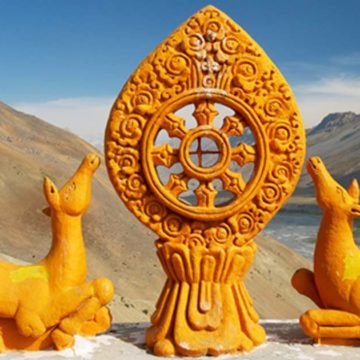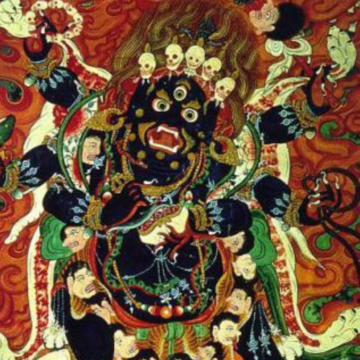"Western polity conceives of doing away with political parties and creating governments of national unity only in times of war or crisis; India, because of her long tradition of a unity underlying her diversity, should have shown that unity is not a freak phenomenon but a workable basis for new politics."
The current political and social systems being followed in India remain wedded to the older British structures. Concepts such as uncoupling of state and religion, secularism et al are based in Judeo-Christian theology; and where it is not available, these become radically unintelligible.
In the third installment of the series titled "Understanding Political Systems Of India", Dr. Pingali Gopal shares his findings from his study of ancient Indian thinkers such as Kautilya, and modern thinkers such as Sri Aurobindo, and Ananda Coomaraswamy, a Sri Lankan Tamil philosopher with a deep understanding of Indian culture.
Enlightened monarchies, free citizens, and decentralised political units glued together by spiritual and cultural unity were the essence of political India in the past. Following independence, India’s attempt at decolonization was less than half-hearted; and thinkers such as Sri Aurobindo were categorically ignored.
Tag: philosophy
Understanding Political Systems Of India – Part 2 – The Political Trajectory Of Post-Independent India
"Much of today’s normative ‘liberal democracy’ has clear theological roots and may not make sense outside the Western world. Universalising and secularising a theological theme may be problematic when applied to Indian culture. Independent India, ignoring indigenous political philosophy, inherited Western values, creating a story of contradictions clashing with the intensely traditional society of India."
In the second installment of the series titled "Understanding Political Systems Of India", Dr. Pingali Gopal brings us a summary of essays of Professor Bhikhu Parekh where he assesses post-Independent Nehruvian India.
Jawaharlal Nehru, Prime Minister from 1947 to 1964, constantly looked at the West as a template for India’s future, rejecting the indigenous past. The article analyses the effects of implementation of Western political thought and primarily British laws in the Indian society which wasn't structured the same way as the West. When implemented in India, the institutions of Western law encourage just the opposite of what such laws are meant to do: a vengeful, spiteful, and ‘selfish’ citizenry. Instead of promoting a cohesive society, such laws encourage divisiveness and conflict in society.
Understanding Political Systems Of India – Part 1 – Political Ideologies – A Dummy’s Understanding of Background Western Theories
"The political spectrum teaches absurdly that opposites are the same. The two ‘positions’ - Left and Right - are the mixing of incoherent, unrelated, and constantly shifting ideas lumped together by the accident of history. Aggressive military positioning hardly connects to a free-market philosophy. Defenders acknowledge this variation but claim an underlying essence: the Right (conservatives), ‘backward looking’, want to conserve; the Left (progressives), ‘forward looking,' want change. Both wings' policies, in fact, are ‘backward-looking’ and marked by nostalgia, depending on the issue."
In the first installment of the series titled "Understanding Political Systems Of India", Dr. Pingali Gopal analyses the multiple prevalent political systems and ideologies of the West, that define world politics as we know it today. These systems have been allowed to influence Indian politics and policy making after independence, with complete disregard to the ancient political systems of India.
The broad classification of political ideology as Right or Left is nebulous at best - one can falsify every proposed essence of right or left, which shows us that ideologies are nothing but social constructs. these Right-Left political ideas do not make sense either in the Western context or in the Indian context, and yet, for decades, we have held on to them. We need to understand our past political systems better, and we need to transcend the paradigm.
Philosophical Systems Of India – A Primer – Part 5
The problems in Western philosophical traditions arise due to many factors, mainly the confusion of the relation between mind and matter; and making philosophy subservient to scientific dogma. Indian philosophy is not a dry intellectual exercise and holds a definite purpose to propel humans into the highest realms of bliss. Indian and Western philosophical traditions run on two parallel tracks consequently.
Philosophical Systems Of India – A Primer – Part 4
In the fourth part of the 5-part series on Indian philosophical systems, Dr. Pingali Gopal discusses the prominent Advaitic view on the notions of the Self and the non-Self. We shall also see the notion of cause and effect in the material world and how the Self interacts with the material world. It is a promise of Indian Darshanas that proper knowledge confers liberation to the striving individual.
Philosophical Systems Of India – A Primer – Part 3
In the third part of the 5-part series on Indian philosophical systems, Dr. Pingali Gopal discusses the most important differing point of Indian philosophies from Western philosophy: Perception as a valid means of obtaining knowledge regarding the objects of the senses. In Western philosophy, perception is unreliable, and in the Indian tradition, perception is the eldest of the proofs needed to understand reality.
Unlike the western notions of an unknowable noumenon where the perceived world loses its intrinsic character, in Indian philosophy a conceived object cannot be unknowable; and if unknowable, it becomes inconceivable as well.
Philosophical Systems Of India – A Primer – Part 2
In the second part of the 5-part series on Indian philosophical systems, Dr. Pingali Gopal discusses the basics as well as the three categories of Indian philosophy, Advaita Vedanta, Vishishtadvaita Vedanta, and Dvaita Vedanta. He also deals with the root cause of the West's outlook on Indian philosophy and presents a rebuttal to some of the popular ideas of disharmony among schools of Indian philosophical thought that have been promulgated by the West.
Philosophical Systems Of India – A Primer – Part 1
In the first part of a 5-part series, Dr Pingali Gopal introduces the ideas of the great Indian philosophical systems to the uninitiated.
Western Philosophers equate philosophy with only western thought which, puts philosophy between theology and science, and in turn, is either ignorant or dismissive of Indian thought.
Indian philosophy (or Darshanas) does not have an extreme reverence for science and because of the biases of the West, and resulatantly has disappeared from popular discourses; being termed ‘religions’ and hence lacking any validity in a ‘secular’ world.
Dr Gopal delves further into classification of Indian systems as orthodox and non-orthodox on the acceptance or rejection respectively of the Vedas as a reliable authority, and uncovers depths of Jainism, Buddhism, Samkhya, Charavaka and Nyaya-Vaisheshika philosophies for the uninitiated.
Further installments of this series will foray into the other orthodox and non-orthodox branches of Indian philosophical systems.
Libertarian Paternalism and Dharma
Authority might suppress individual rights and wants, while individual liberty might lead to internal conflicts within the society or sub-optimal collective growth.
Buddhism versus Hinduism: Encounters of the imagined kind(Part I)
The often misunderstood relationship between Hinduism and Buddhism is the work of those who intend to create a rift between the two Indic faiths.




